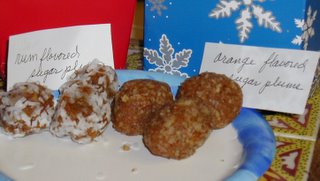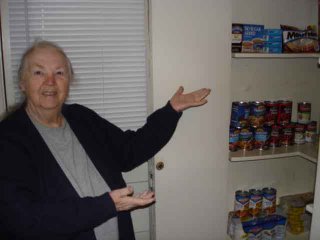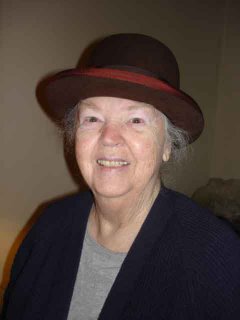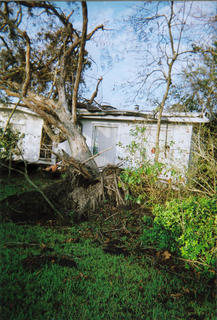In a recent IM chat with my sister, Esther, she offered to make me a muumuu. Mine had finally worn out and was beyond patching and I was complaining. Of course I accepted her offer! Esther is a whiz with a needle. She started sewing before she was old enough to go to kindergarten. Mom used to tell how she would sit on the floor under the dining room table and amuse herself for hours sewing clothes for little celluloid dolls. I could never come close to matching her sewing ability; in fact I never really learned to sew. Sewing machines remain a mystery to me.
When Esther was a baby learning to walk, we older ones loved playing with her. She looked like a doll in the pastel colored dresses and panties Mom made for her. We older ones played a game of pretending to drop things and she would pick them up for us. We thought it was hilarious when she bent over and her ruffled panties showed.
Esther was sixth in birth order; bunched between three older brothers and the two youngest. She was the third and last girl to join the family. In Mom’s last years she still called Esther her ‘baby girl’. When Esther was small, she fell off the steps of the back porch near our tomato patch and cut her cheek on a piece of broken glass hidden in the tall weeds next to the steps. When the doctor came to the house to treat Esther, he lectured Dad for not keeping the area clear of hazards and expecting Mom and us older ones to do it. The cut left a jagged scar, but fortunately, it lightened and became less noticeable as she got older.
Esther and the boys attended an old fashioned country school when we lived on the asparagus farm in Iowa Falls, but Adeline and I continued high school classes in town. Esther had beautiful, long red hair, a peach and cream complexion and an affectionate temperament. She wore her hair in French braids. Occasionally, when Mom was too busy getting everyone ready for school in the mornings, Adeline or I would do her hair, although I never learned to French braid and did the regular three strand braiding.
During the war when Dad’s office transferred him to San Francisco, the family lived on Hillcrest Drive in Redwood City, a peninsula town. Esther started to design and sew some of her clothes when she went to Sequoia high school. I remember being very impressed with one of her house coat designs.
During the war, Esther met Vernon, a charming young sailor from Baton Rouge, Louisiana that one of our brothers had befriended. They fell in love and corresponded while he was overseas in the Pacific. When he returned to the states at the end of the war, he wanted to marry Esther, but the folks thought she was too young and asked them to wait. They threatened to elope, so the folks gave permission. My husband and I had the wedding and reception at our home in the Redwood City foothills. Esther was so beautiful in her white satin wedding gown. Friends of Mom and Dad loaned Vern a convertible to drive while they honeymooned on King’s Mountain. They lived in California until after their second baby girl was born, then made a permanent move to Baton Rouge, Louisiana, Vern’s home town.
Esther saved her family a lot of money using her sewing talent to make school dresses for her three daughters and western shirts for Vern. The beautiful wedding gown she made for her oldest daughter has been loaned to cousins to wear at their weddings.
After raising a family and retiring, Esther and Vern moved to Toledo Bend, Louisiana, a resort area where Vern fished and Esther studied to become a ham radio operator like Dad had been prior to WW II. Her FCC license was upgraded from Novice, to Technician, to General and eventually to Extra, the highest, and she participated in various radio networks.
About the time Esther and Vern moved to the lakes, Mom and Dad moved to southeast Texas. Vern kept the folks supplied with freshly caught big mouth bass, and veggies from their garden. Mom started quilting in earnest when Dad made her a quilting frame. She liked quilting, but didn’t like ‘piecing’ them, so she paid Esther to make tops for her. After they decided on colors and patterns, Esther would make two tops, one for Mom and one to keep. In this way, they both had quilts to sell and give away as presents to family members.
Vern passed away several years ago and Esther now lives with a son in Baton Rouge. Her three married daughters live near by. She is truly blessed with a loving family and grand children. Esther reminds us of Grandma W in looks and attitudes, but she is like Grandma A when it comes to needlework. Grandma A was also hard of hearing and found pleasure in quilting, knitting and crocheting. Since Esther’s hearing loss has deepened in recent years and prevents her from participating in the radio networks she enjoyed for so many years, new doors have opened for her. She has taken to computers like a duck takes to water. She also discovered beading. If she isn’t sewing or crocheting something for a new grandchild, she’s finishing work on a counted cross stitch project, working with beads or starting a new quilt. As if that isn’t enough, she is now making me a muumuu!!!!







 Here’s a picture of the old pecan tree that fell on the house during the hurricane.
Here’s a picture of the old pecan tree that fell on the house during the hurricane.